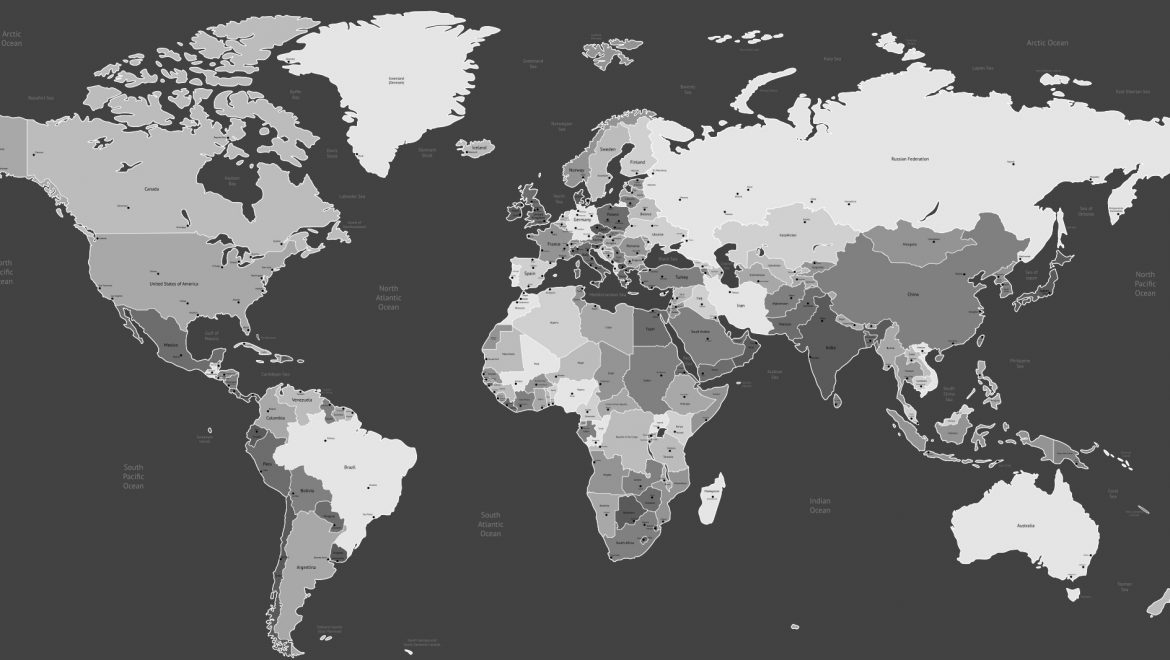By Matthew Salzano ’18
Professor Oksana Ezhokina, Chair of Piano Studies, will spend her time in concert halls and recording studios.
What are you doing for your sabbatical in Spring 2018?
I have a twofold kind of project. One of the parts is recording all works by Rachmaninoff on two piano with my dear colleague, Christina Dahl. It’s three very large scale works for two pianos; first suite, second suite and symphonic dances. It is about 70 to 80 minutes of music; lush, gorgeous, rich and technically challenging. To get ready for that, we’ll do some concerts on the east coast in Pennsylvania, New York, and I think West Virginia.
Why Sergei Rachmaninoff?
I grew up surrounded by this music, since I grew up in Russia. For anyone who plays the piano, this particular name is sort of like a sacred name because he was such a tremendous pianist. He wrote such exciting, challenging, and heart-rending music for this instrument. It’s natural that anyone who plays the piano would be drawn to his music. I love the language, the sound, the power embedded in his works.
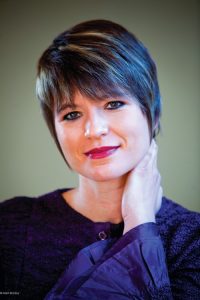
What are you going to miss while you’re away?
I’m sure two months into my sabbatical, I’m going to be really wishing I was back teaching! My students are amazing individuals. They are really the reason why this job is so fulfilling and exciting for me. It’s that human element as well — not just the lessons, but the kind of relationship you create with a person you are working with on a common project.
Professor Spencer Ebbinga, Associate Professor of Art and Design, was the Site Director for the 2017 China Gateway program in Chengdu.
What were you teaching in Chengdu?
I was teaching a course in China Painting. This ancient technique of decoration actually involves painting very low temperature glazes onto ceramic wares, typically porcelain. Students and I will be creating and using imagery from our travels in China (be they pictures, memories, ideas, notions, etc.) to create a visual record of our thoughts, emotions, routines, and experiences.
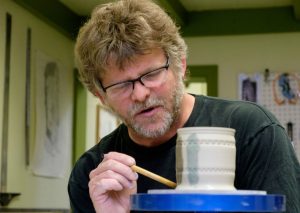
What did students create?
Basically we recorded personal narratives of our journey in a ceramic medium. I also led the discussion section of the Western China Seminar, a required course for the program. This allowed us to process what we were learning as a group and to place this information into context not only for the semester, but as a transformational event in our lives.
How did you get involved with this program?
This is one of those weird crossroads in life you could never expect to happen. This was my fourth visit to China, and my second as the Site Director for the program.
In 2008 I was awarded a PLU Regency Advancement award to attend an international ceramics conference in Jingdezhen, which I thought was a once in a lifetime opportunity. This experience really piqued my interest and led to conversations with Greg Youtz (PLU Professor of Music), which in turn led to another trip all across China as a part of the Freeman Foundation Grant Program to foster Asian studies in our region. Soon after, Neal Sobania (Professor of History, at that time, the director of the Wang Center), asked if I would be interested in being the 2012 Site Director in Chengdu for a semester. The opportunity to take my family and actually study/teach in China for three and a half months was a no-brainer, and off we went…one suitcase each. When I was asked if I would be interested in repeating the experience this year, I figured it was a vocational calling and perhaps this journey will finally help me understand why the first occurred…sincerely. It seems to me when something occurs repeatedly, one should ask themselves why? This journey is as much about my learning and understanding of not only China, it’s people, and our students, but of myself.
What were you most excited about?
Noodles, spice, eggplant, street food and the night markets. I looked forward most to the shared experiences and developing relationships with the students and the people in China. Sounds a bit cliche, but it is absolutely the truth. Being in China is much like experiencing “southern-hospitality” in the US. The people are so gracious, kind, interesting, helpful, and want to spend time getting to know us…until you have to queue in a line which is really an interesting take on contact sports, patience, understanding, empathy, and self control. Sharing this with our students and being a part of their journey into personal and global awareness is quite a gift faculty are blessed with.
What’s one thing you missed from PLU while you were away?
The art studio. After the first couple of weeks being immersed in the Chinese culture always has me chomping at the bit to make art…to express the moments, the feelings, to share visually the wonders we find in unfamiliar places. In the meantime, I was placated with calligraphy in our Chengdu apartment and nature-journaling with my wife and two daughters in city parks.
Dr. Joanne Lisosky, Professor of Communication, is fulfilling a Fulbright Teaching Assignment at College of Science, Technology and Applied Arts in Trinidad & Tobago.
What are you looking forward to?
My primary mission will be teaching journalism and developing curriculum for journalism certification… and maybe (figures crossed) starting up a student magazine. COSTAATT hosts the first and only journalism school in Trinidad & Tobago. I’m looking forward to learning much more than I teach. I’ve been given my scholarly charge by the President of COSTAATT, Dr. Gillian Paul. She asked me to coach her faculty in the production of scholarly publications.
Have you done fulbright before?
This is the third Fulbright teaching award for me… previously in Kampala, Uganda and Baku, Azerbaijan. In both of these cases, I was much more a student than teacher.
What will you miss at PLU?
I will sorely miss watching the growth of my 2014 first-year advisees who are graduating this year. 😉
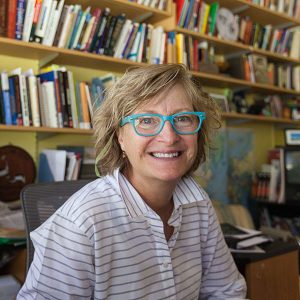
Dr. Jeffrey Bell-Hanson, Director of Orchestral Activities, will be researching an historic piano.
What are your sabbatical plans?
The project that I proposed and received approval for research is the history of a musical instrument in my possession. It’s a 7′ grand piano made by the Henry F. Miller Company of Boston in 1910. Miller made instruments at that time of a very high quality. The maker’s intention was to compete with the finest artist pianos of the day, especially Steinway.
This piano would have been an expensive instrument at the time, not likely to have been found in the average working or middle class home. So the fact that it had made its way to a remote rural area of Upper Michigan (where it was donated to a university, and eventually sold to me), means that it was probably owned by someone of considerable wealth in the community, or perhaps even a business or institution. Since this was a major copper mining area from the mid-nineteenth into the early twentieth century, it was probably owned by someone in a management position with one of the mining companies there. It is also well documented that a majority of these mine owners and executives came to the area from Boston.
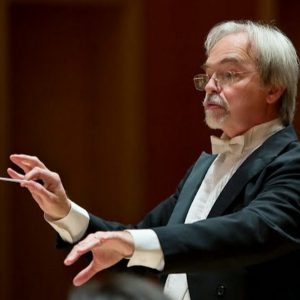
These facts suggest the possibility that the piano came with one of those families to the area. However, my initial archival research has shown that Miller pianos were sold locally in one of the several piano shops in business there at the time. However it arrived there, it clearly had a decades-long presence in someone’s home or some community facility, or a combination of both.
How did you become interested in this?
I have been, for several years, interested in the definition and origin of a sense of vocation for the musician. Some of my reading and writing on this subject has been done in collaboration with other faculty in the context of the Wild Hope Project at PLU.
My own experience with what I recognize as my own sense of vocation can be traced back to a feeling of comfort and play that I experienced as a young child in part, I think, because we had a piano in our house. I had frequent access to it both supervised and unsupervised, and it became a means of exploration and self-expression for me.
I believe that I will find scholarship supporting and trying to explain this phenomenon of early musical exposure. That’s one of the things I’ll be looking at as background this year.
My hope is to be able to find people or their descendants who knew this instrument and experienced some notable effect of its presence in their environment. If not this specific instrument, then another or others like it–in the context of this otherwise remote and culturally isolated area. I have obtained clearance from the HPRB to speak to any such individuals whom I find. Their stories will become part of this work, as long as they agree.
I have started a blog already that will be partly about my research, but will include discussions of other subjects too–mostly about music. It’s called “Beating in Air,” and you can find it here: https://beatinginair.blog/
What are you most looking forward to?
Time without meetings and governance work, and not having the regular schedule that ties me to campus so closely most years. This time will be important in allowing me to pursue the sorts of thought experiments and study that scholarship requires.
What is on your ‘scholarly agenda’ for your sabbatical?
I have already described the major research project. The product, I hope, will be an article. I dare not hope to find a rich enough vein to make a book, though that would be terrific. One important side benefit is to create a sort of abstract for this instrument that can travel with it into its future. It’s been around for 107 years and is still a wonderful instrument. I need to have some major work done on it. When I have done so, both the instrument itself and its story will be a legacy that I can pass onto the next generation.
What’s one thing you’ll miss most while you’re away?
The PLUSO, of course, and seeing my colleagues. Meeting students in class is also fun, or I wouldn’t do it. So that will be missed. I will not miss grading or meetings or the administrivia of making all the events I plan work. (Actually, I have done a considerable amount of that this summer for the coming year anyway.)

